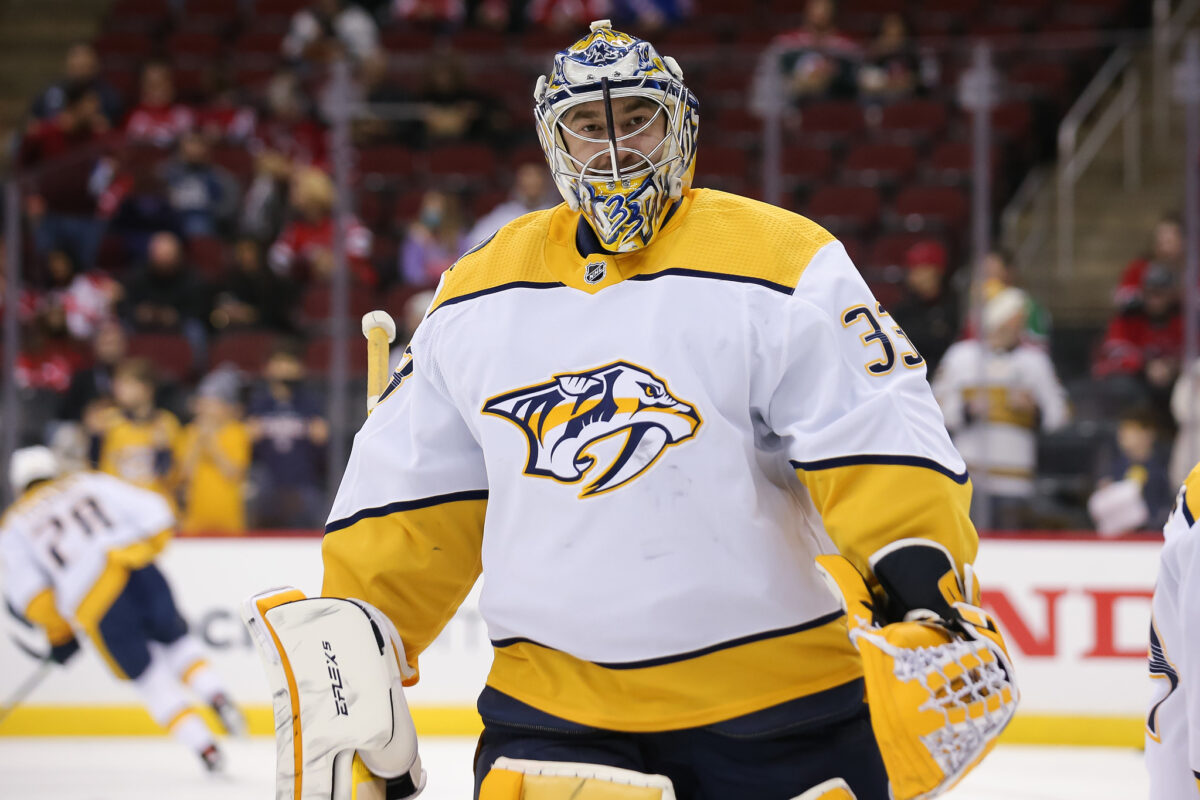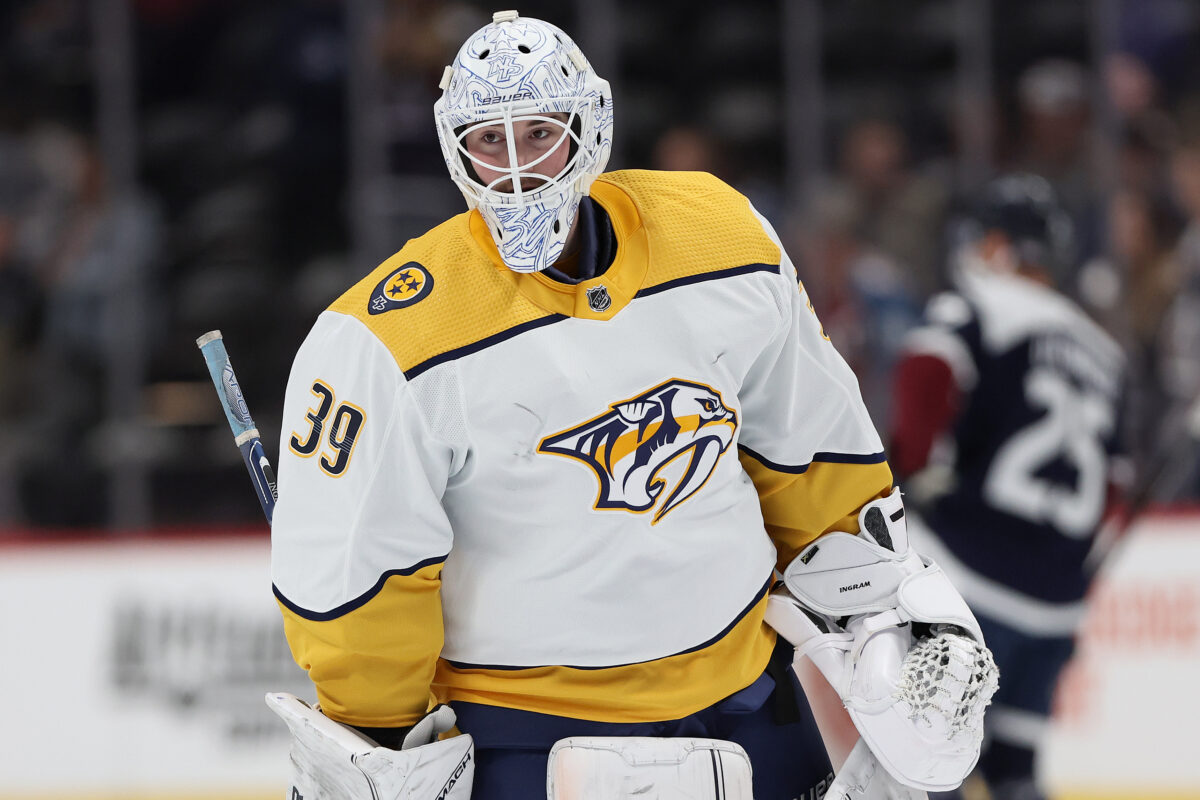The Nashville Predators entered Game 1 against the Colorado Avalanche as massive underdogs, and for good reason. Without the services of starting goaltender Juuse Saros, their chances of completing an upset in a seven-game series took a massive hit. While it was expected to be a tough matchup for John Hynes and his group, nobody expected what Game 1 had in store for them.
Related: 3 Takeaways From Avalanche’s 7-2 Win Over Predators in Game 1
Two quick goals in the opening minutes set the tone as the Avalanche steamrolled the Predators 7-2. It was the result Predators fans feared going into the game, and the way Nashville played, from first puck drop to the final whistle, failed to encourage a possibility of an upset. While Matt Duchene scored a pair of goals, the only ones registered by the team, it didn’t fare well against Colorado’s touchdown and conversion.
Nashville will have a day’s rest to go over tape, iron out some details, and prepare for Game 2 on Thursday. With Saros listed as unavailable, the Predators will have to continue relying on the services of David Rittich and Connor Ingram. Before then, let’s take a look at some of the concerning trends from Game 1 and what to look out for as the series progresses.
Predators’ Abysmal First Period
When you look at a team that surrenders three goals in the opening 10 minutes of the first period, generally, the goaltender receives the first wave of finger-pointing. Rittich wasn’t good to start the game, and he couldn’t keep up with the Avalanche’s speed. In his 15 minutes of play, he allowed five goals on 13 shots, and looked uncomfortable even after making a routine save. Unfortunately, the team around him didn’t do much to help. As the seconds counted down for the first period, Nashville was outshot, out-chanced, and out-worked in every facet. The Predators went long stretches in the opening period without a shot, often having less shots on goal than the Avalanche had goals. It was a masterpiece at one end of the ice and a train wreck at the other end.

The Avalanche finished with seven scoring chances on 17 shots compared to Nashville’s one scoring chance on six shots. Colorado’s five-goal first period set the pace for the remainder of the game, as the team clogged up the neutral zone, giving very little for Nashville to work with. Avalanche head coach Jared Bednar got goals from three of his four lines and two more from the blue line, and they added insult to injury be registering both a powerplay and shorthanded goal. It was the game you’d expect from a team considered as the strongest contender for the Stanley Cup.
Predators’ Herd Line was Ineffective
One of the things Predators fans were most excited about was the team’s third line, otherwise referred to as the “Herd Line.” Tanner Jeannot, Yakov Trenin, and Colton Sissons had great seasons and provided the team with the secondary scoring required to help elevate their place in the standings. It gave the top two lines more room and opportunity and created an offensive dynamic that hadn’t been seen for a long time in Nashville. It was also the first taste for rookie Jeannot, who should be thriving in playoff hockey, but Game 1 was an experience he’d probably like to forget.

At times, the trio looked overwhelmed and trapped in their end. It didn’t help that Colorado’s third line had a decent game of their own, and Sissons’ line looked to be a step behind on almost every shift. There were brief moments when the Herd Line managed to hem Colorado in their own zone and get their cycle game going, but Colorado’s defense handle each situation perfectly, forcing any shots to the outside. Goaltender Darcy Kuemper‘s night was relatively easy compared to the netminders at the other end.
Jeannot finished with a minus-3 rating, and the line, as a whole, combined for minus-4. The Predators’ top six failing to produce much offense didn’t make things easier on the team, but the third line will need to be much better. General manager David Poile left the group intact, only acquiring Jeremy Lauzon for some defensive depth, believing that the team had what it took. They’ll need to get things going in Game 2 if they wish to stand a chance, and it begins with getting back to their style of suffocating physical play and better puck management.
Predators’ Ingram Provides Sliver of Hope
One of the only positives from Nashville’s efforts in Game 1 was Ingram filling in for Rittich in the first period. After allowing five goals on 13 shots, Rittich received a mercy pull in favour of Ingram, who had played a career total of three games to date. In less than five minutes coming in, he was pelted with four shots and tested constantly. Ingram did everything to keep the Predators alive, stopping 30 of 32 shots and looking more confident as the game went on. He had a massive third period when the Avalanche could have run up the score, and the debate heated upon whether he should get the nod for Game 2.

Already ruled out for the first two games of the series, Saros won’t draw in until at least Game 3. Even then, this isn’t confirmed, and the Predators may have to live and die by the sword that is their current goaltending tandem. The Predators can’t risk fumbling another game the way they did in Game 1, and Ingram currently serves as the better option of the two netminders. He is unproven, but his contributions in relief of Rittich aid the belief that he could be the wild card this team needs to compete against the Avalanche.
Nashville doesn’t have much time to re-calibrate and prepare themselves for Game 2. The Avalanche are like a shark that smells blood, and they’re a different beast at home in front of a thunderous crowd. To avoid going back to Nashville down two games to none, the Predators will need their top-six scoring to replicate their regular-season form if they hope to stand a chance. Otherwise, this series will be short-lived, and Predators fans will have more questions than answers.